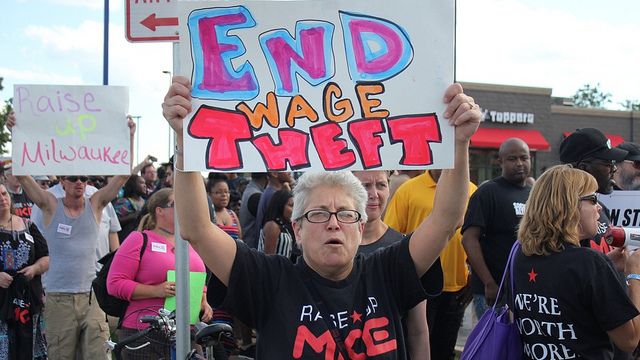
Last week, the Kentucky Labor Cabinet released a report which found that the “money taken each year in Kentucky during all robberies combined falls well short of the total amount of wages improperly withheld from Kentucky’s workers.”
The agency collects an average of $4.5 million every year from employers as restitution for ripping off their workers. According to the report, losses from all other forms of theft in the Bluegrass State amount to around $2 million. “You hear about robberies on the news all the time, but wage theft is a bigger problem,” said Labor Cabinet Secretary Larry Roberts in a press release. “Wage theft happens every day in Kentucky, and it impacts numerous industries and multiple types of workers.”
“Wage theft” is defined as an employer not paying workers money that they’ve clearly earned. Paying less than the legal minimum wage, not compensating employees for the full number of hours they worked and not paying overtime are all forms of wage theft.
The numbers released by the Kentucky Labor Cabinet most likely only scratch the surface of the problem because states and localities tend to devote scant resources to enforcing wage and hour laws. The Census Bureau’s most recent survey, in 2008, found that Kentucky had 389 law enforcement agencies employing over 10,000 law enforcement personnel. That’s a cop for every 243 residents. But there are just 15 wage and hour field inspectors policing the state’s 1.9 million wage earners. That’s just one enforcement official for every 126,600 workers.
Wage theft is anything but a Kentucky problem. Kim Bobo, founder of Interfaith Worker Justice and author of Wage Theft in America: Why Millions of Working Americans Are Not Getting Paid, tells BillMoyers.com, “If you eat at restaurants, shop at retail stores, hire someone to mow your grass or clean your house, get your car cleaned at a carwash, or get your nails done professionally, you probably have been served by workers who are victims of wage theft. Wage theft is a widespread crisis that hurts workers, ethical employers who are placed at a competitive disadvantage and all taxpayers.”
While the National Employment Law Project (NELP) finds that “wage theft takes place in industries that span the economy,” it disproportionately impacts the most vulnerable workers — part-timers, recent immigrants and those without a lot of education.
In 2008, NELP, along with the Center for Urban Economic Development and the UCLA Institute for Research on Labor and Employment, conducted a landmark survey of 4,387 low-wage workers in the three largest American cities — New York, Los Angeles and Chicago — which found rampant wage theft, and other labor law violations, at the lower end of the labor market. Among the findings:
— 26 percent of workers surveyed were paid less than the legally required minimum wage in the previous work week.
— 60 percent of those workers were shortchanged by more than $1 per hour.
— Over a quarter of all respondents worked more than 40 hours during the previous week, and 76 percent of them were not paid the legally required overtime rate by their employers.
— The average worker who wasn’t fully compensated for overtime had put in 11 of those hours the previous week.
— 30 percent of tipped workers who responded to the survey weren’t paid the legal minimum for tipped employees.
— 12 percent of those workers reported that their employers or supervisors had stolen tips in the past.
Although wage theft is a problem nationwide, the same scarcity of resources that keeps Kentucky from tackling these crimes is seen at the federal level as well. According to a 2005 study conducted by NYU’s Brennan Center for Justice, the number of workplaces covered by the US Department of Labor’s wage and hour division more than doubled between 1975 and 2004 — and the number of workers in those establishments increased by 55 percent — but the number of inspectors available to enforce basic labor standards fell by 14 percent during that period, and the number of “compliance actions” the agency completed plummeted by more than a third.
This work is licensed under a Creative Commons Attribution-NoDerivatives 4.0 International License.


